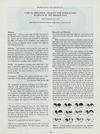 101 citations,
November 1992 in “Archives of Dermatology”
101 citations,
November 1992 in “Archives of Dermatology” Steroids help hair regrowth, and minoxidil slows post-steroid hair loss, but effects are temporary.
 10 citations,
August 2012 in “Current Problems in Pediatric and Adolescent Health Care”
10 citations,
August 2012 in “Current Problems in Pediatric and Adolescent Health Care” Hair changes can indicate systemic diseases or medication effects.
[object Object]  114 citations,
January 2007 in “Drug Safety”
114 citations,
January 2007 in “Drug Safety” Some drugs can cause skin, nail, and hair problems, which are important for healthcare professionals to recognize and report.
 78 citations,
March 1987 in “Journal of The American Academy of Dermatology”
78 citations,
March 1987 in “Journal of The American Academy of Dermatology” Minoxidil promotes hair growth but stops working when discontinued.
 76 citations,
January 2007 in “American Journal of Clinical Dermatology”
76 citations,
January 2007 in “American Journal of Clinical Dermatology” Women with PCOS often have skin problems like excessive hair, acne, hair loss, and dark patches, which can be treated with hormonal and non-hormonal therapies.
 72 citations,
December 1983 in “Journal of Investigative Dermatology”
72 citations,
December 1983 in “Journal of Investigative Dermatology” Minoxidil helps hair cells live longer and grow longer.
[object Object]  66 citations,
June 2018 in “International Journal of Women's Dermatology”
66 citations,
June 2018 in “International Journal of Women's Dermatology” No cure for female pattern hair loss, but various effective treatments exist.
 35 citations,
May 2012 in “Cochrane Database of Systematic Reviews”
35 citations,
May 2012 in “Cochrane Database of Systematic Reviews” Minoxidil effectively treats female pattern hair loss.
 34 citations,
January 1997 in “Skin Pharmacology and Physiology”
34 citations,
January 1997 in “Skin Pharmacology and Physiology” Minoxidil affects cell growth in two ways: low doses increase growth, while high doses slow it down and can be toxic.
 28 citations,
January 1989 in “Toxicologic Pathology”
28 citations,
January 1989 in “Toxicologic Pathology” Minoxidil may cause heart changes; use caution and monitor patients with heart conditions.
 25 citations,
May 1986 in “The American Journal of the Medical Sciences”
25 citations,
May 1986 in “The American Journal of the Medical Sciences” Minoxidil helps hair growth and boosts self-esteem in balding men.
 18 citations,
August 2019 in “Journal of Cosmetic Dermatology”
18 citations,
August 2019 in “Journal of Cosmetic Dermatology” PRP therapy may increase hair density in pattern hair loss without serious side effects, but more research is needed.
 12 citations,
May 1989 in “Postgraduate Medicine”
12 citations,
May 1989 in “Postgraduate Medicine” The document concludes that hair loss is common and can be treated with medications like minoxidil or surgical options, and it significantly affects people's psychological well-being.
 8 citations,
January 2020 in “Skin appendage disorders”
8 citations,
January 2020 in “Skin appendage disorders” Saw palmetto supplements may modestly improve hair regrowth with few side effects, but more research is needed.
 5 citations,
October 1993 in “International Journal of Dermatology”
5 citations,
October 1993 in “International Journal of Dermatology” Topical minoxidil is effective and safe for hair regrowth in Middle Eastern men with early baldness, with better results in younger patients and certain types of baldness.
 January 2019 in “Acta dermatovenerologica Alpina, Pannonica et Adriatica (Tiskana izd.)”
January 2019 in “Acta dermatovenerologica Alpina, Pannonica et Adriatica (Tiskana izd.)” Non-ablative radio frequency can potentially increase hair count in men with androgenetic alopecia, but some may be bothered by the smell during treatment.
 164 citations,
April 2008 in “Cochrane library”
164 citations,
April 2008 in “Cochrane library” Current treatments for alopecia show no significant long-term benefits.
 162 citations,
August 2002 in “Survey of Ophthalmology”
162 citations,
August 2002 in “Survey of Ophthalmology” Latanoprost can make eyelashes longer, thicker, and darker.
 149 citations,
April 2004 in “Journal of Dermatological Science”
149 citations,
April 2004 in “Journal of Dermatological Science” Minoxidil boosts hair growth by increasing cell production and survival.
 81 citations,
March 2009 in “Seminars in Cutaneous Medicine and Surgery”
81 citations,
March 2009 in “Seminars in Cutaneous Medicine and Surgery” Effective hair loss treatment in women requires correct diagnosis and can include medications like minoxidil, antiandrogens, and treatments for underlying conditions like PCOS.
 57 citations,
July 1987 in “Journal of The American Academy of Dermatology”
57 citations,
July 1987 in “Journal of The American Academy of Dermatology” Stopping minoxidil treatment resumes balding; continuous use needed for results.
 54 citations,
March 1987 in “Journal of The American Academy of Dermatology”
54 citations,
March 1987 in “Journal of The American Academy of Dermatology” 3% topical minoxidil effectively treats extensive alopecia areata with few side effects.
 53 citations,
March 2014 in “Cold Spring Harbor Perspectives in Medicine”
53 citations,
March 2014 in “Cold Spring Harbor Perspectives in Medicine” The document explains different types of hair loss, their causes, and treatments, and suggests future research areas.
 46 citations,
September 2010 in “Southern Medical Journal”
46 citations,
September 2010 in “Southern Medical Journal” Hair loss treatments include medications and new methods like low-level light therapy, which may work by boosting cell activity and blood flow.
 36 citations,
March 2002 in “Journal of Biological Chemistry”
36 citations,
March 2002 in “Journal of Biological Chemistry” Food deprivation increases MST enzyme in the brain, possibly affecting energy balance.
 32 citations,
December 2000 in “Phytomedicine”
32 citations,
December 2000 in “Phytomedicine” Apple-derived procyanidin B-2 can safely promote hair growth in men.
 31 citations,
April 1999 in “Dermatologic Clinics”
31 citations,
April 1999 in “Dermatologic Clinics” Nd:YAG laser can reduce hair with multiple treatments, but permanent removal isn't guaranteed.
 28 citations,
December 2019 in “Skin appendage disorders”
28 citations,
December 2019 in “Skin appendage disorders” Some medications might reverse gray hair, especially those that reduce inflammation or stimulate pigment production, and vitamin B might help.
 27 citations,
September 2017 in “Journal of Medicinal Food”
27 citations,
September 2017 in “Journal of Medicinal Food” Annurca apple supplement safely increases hair growth and keratin in humans.
 17 citations,
January 1985 in “International Journal of Dermatology”
17 citations,
January 1985 in “International Journal of Dermatology” Minoxidil may help hair growth by stopping immune system attacks on hair follicles.






























